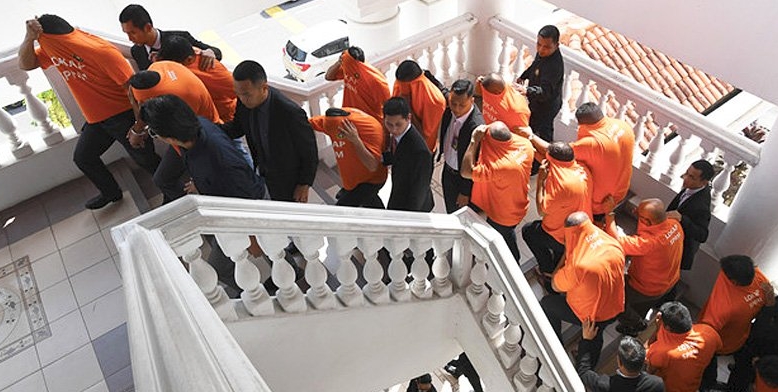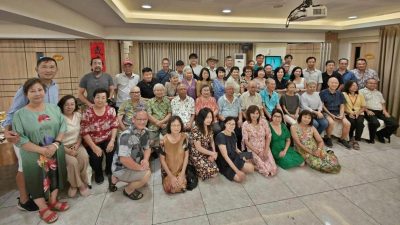
By Mariam Mokhtar
Corruption cannot be solved just by punishing the takers. The givers need to be punished too, but punishment alone is insufficient. Education and prevention should be part of the cleaning-up process.
Education should start in schools. Today, many Malaysians view corruption as part of their daily lives. This is wrong.
Our children need to be taught a new set of values. They have seen their leaders get away with stealing taxpayers' money, and they are led to believe that this is OK.
Children may not realize that corruption kills. When a bus is allowed to pass its vehicle checks, even though the brakes are faulty, because a bus company has paid-off a Road Transport Department (RTD) officer to overlook the fault, several people may die if an accident happens.
Adults need re-education too. A few years ago, a MAS employee allegedly boasted that a cabin crew member's house was full of MAS business class and first class toiletry bags, even toilet rolls. She said, "The directors take millions of ringgits, the managers get paid for bogus contracts for non-existent services; what is a few ringgit worth of these items to anyone?"
The prevention measures are also critical. Can it be possible that the head of a government department is not aware that his staff is corrupt? There are the tell-tale signs of luxury holidays abroad, the cars his family members drive, the luxury watches, the boasting and gossip from envious staff who do not enjoy the proceeds of crime. Corrupt officials may not be able to explain their wealth. They may deposit the money in proxy bank accounts.
Corruption should not be tolerated and every corrupt employee should be reported. However, Malaysians will rightly claim that their complaints fall on deaf ears, and anyone who dares complain is given a hard time.
A company owner who complains about a corrupt RTD official may suddenly find that his company vehicles fail their annual inspection. Someone applying for government land may find that his application is incomplete or has been "lost". The businessman knows that delays cost money, so he pays up.
Others who have taken their driving tests allege that they were purposely failed because they refused to give "kopi" money. When some of them lodged a report, they were asked for proof.
Another person alleged that his employer's sports shop was raided by customs officials for failing to pay duty on the goods he had imported. Instead of levying duty for the goods and a fine, they simply took money and sports equipment and paid him monthly "visits". None of these were recorded officially in the customs reports.
Many people will have horror stories about policemen asking, "Macam mana mau settle?" (how shall this be settled?) at police road blocks, or lone policemen on kapcais who stop drivers for a supposed traffic violation.
Potential restaurant owners have similar nightmares when trying to obtain a fire safety certificate. Despite careful planning with appropriate experts and planners, the fire officers will find some supposed faults which the owners claim are easily resolved with a sweetener.
In April 2019, three waves of RTD arrests resulted in 100 people being interrogated, including 75 of the 139 enforcement officers from Penang RTD. In the end, 46 officers were charged with corruption.
Most Malaysians were not shocked at the large number of arrests. They were more shocked that it took so long to get to this stage.
In the Penang RTD scandal, the corruption was not exposed by an internal probe, an MACC investigation, a police raid, or tip-off from a road user. A woman whose former husband had divorced her and remarried, allegedly blew the whistle on the RTD.
It was alleged that her former husband had been part of an elaborate syndicate involving lorry drivers and transport companies. She was furious with her husband’s infidelity that she provided MACC with the syndicate’s transaction records. She wanted to punish her husband, but she did the rakyat a favor.
This says a lot about the integrity of the RTD staff.
The scandal involved the Penang RTD. What about RTD in other states? How many millions of ringgit are paid to greedy RTD officials?
Last week, MalaysiaKini conducted a special investigation into corruption in the RTD and concluded that it was back to normal for RTD.
When the Penang scandal was exposed, the staff in RTD of other states instructed companies not to pay them until the coast was clear again. Now that they are back in business, RTD officers are demanding compensation for the months they were not paid.
Greedy, selfish and corrupt RTD staff enrich themselves. They deprive the nation of much needed revenue. The money from fines for errant companies and individuals could have been used to improve staff training, provide better equipment and facilities, and improve road safety.
Those of us who think corruption cannot be eradicated need to read about the successful clean-up of the corrupt police force and government departments in Hong Kong 46 years ago.
Hong Kong did it. So can we.
(Mariam Mokhtar is a Freelance Writer.)
Source:
1. YouTube: JPJ to give full cooperation in bribery probe against its officers
2. Free Malaysia Today: Penang Grab drivers claim harassment by RTD officers
3. Weehingthong: The jilted wife and the arrest of JPJ Penang officers: Beware the wrath of a woman scorned!
4. Free Malaysia Today: 70 investigation papers prepared on Penang JPJ protection racket, says MACC
5. Wikipedia: Independent Commission Against Corruption (Hong Kong)
6. MalaysiaKini: Institutionalized corruption in RTD grips logistics industry, turns clean firms dirty
ADVERTISEMENT
ADVERTISEMENT


































